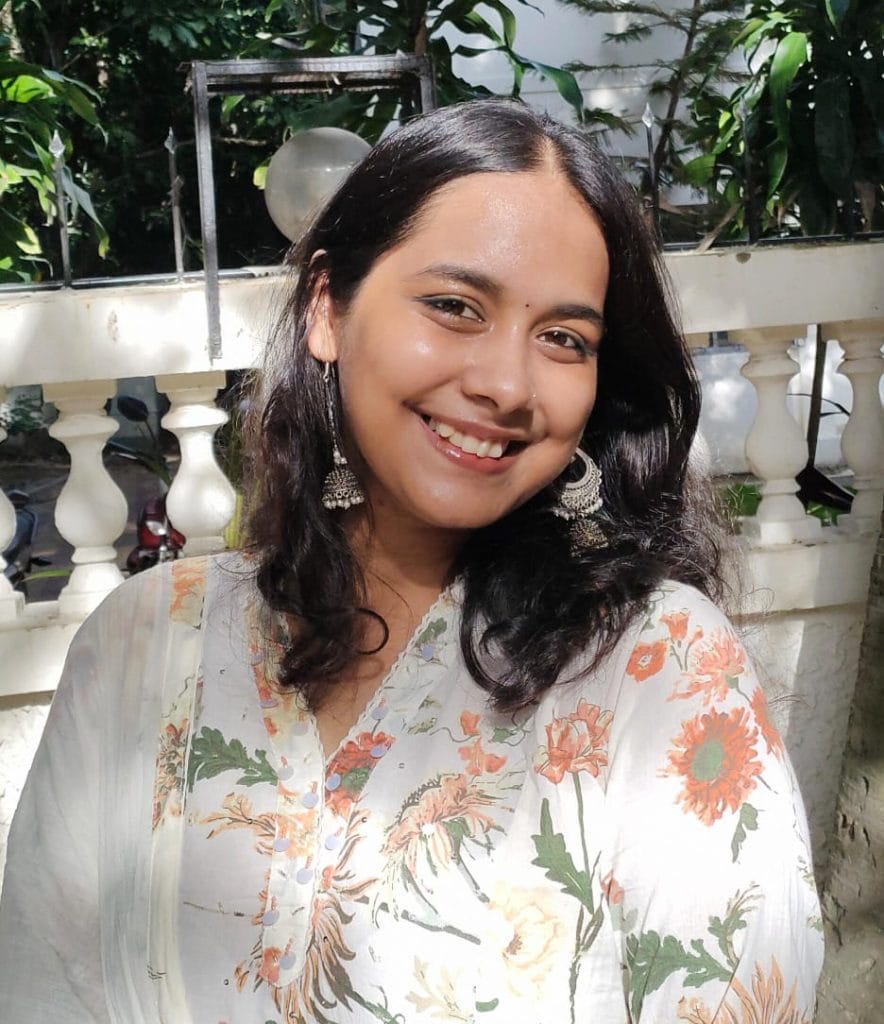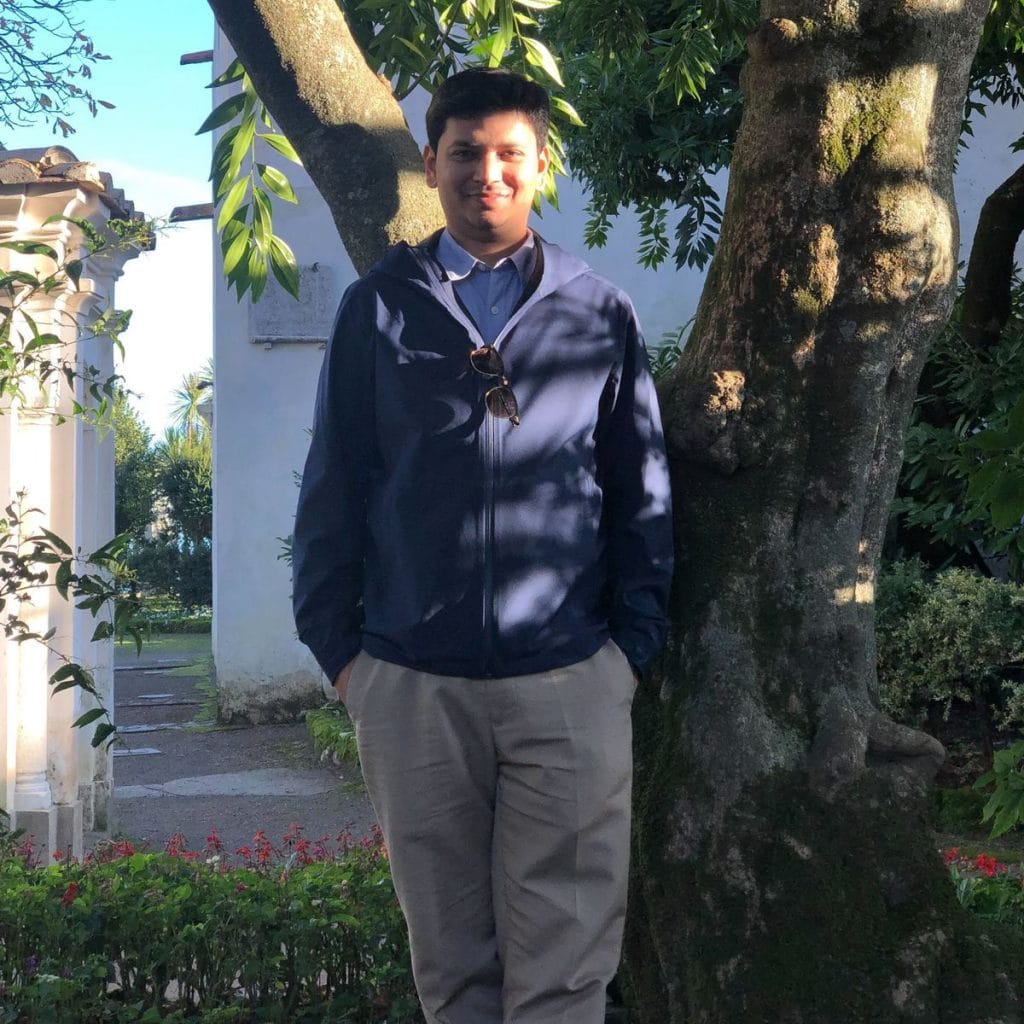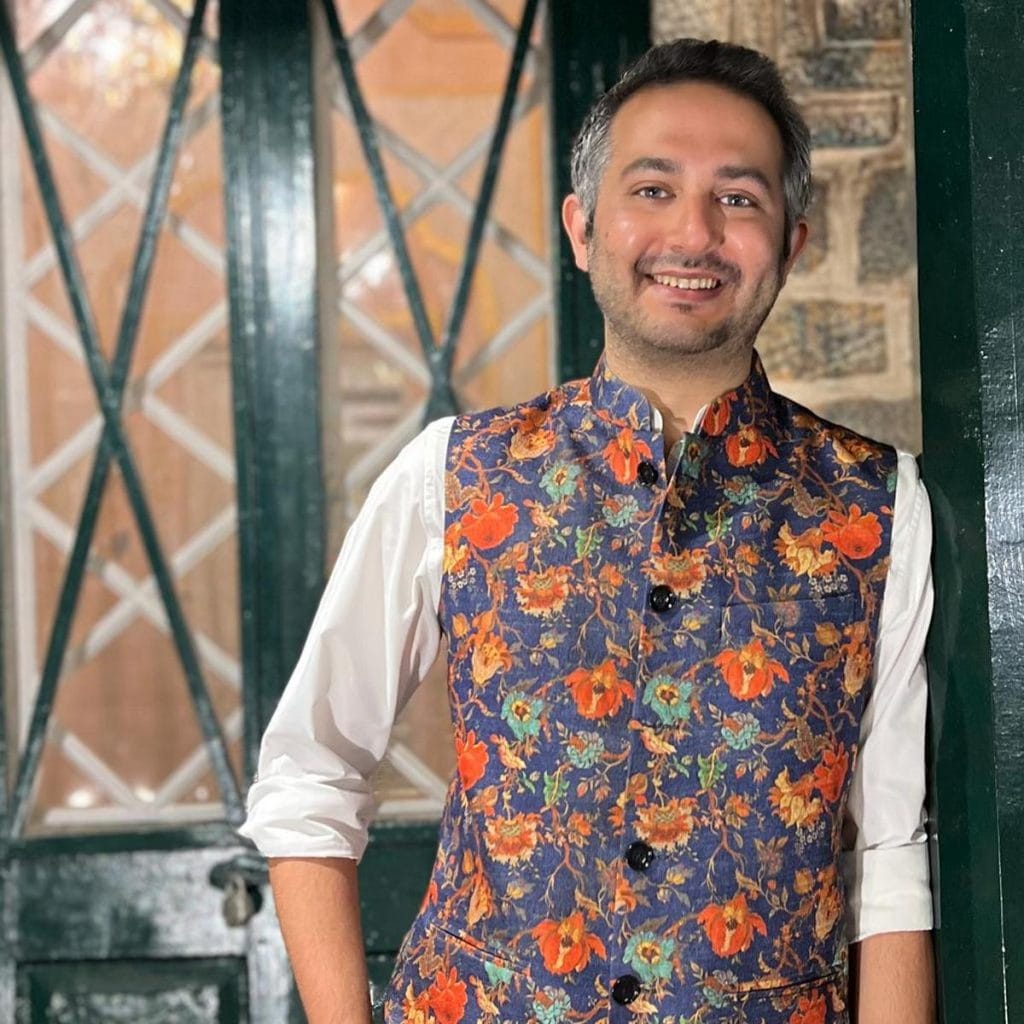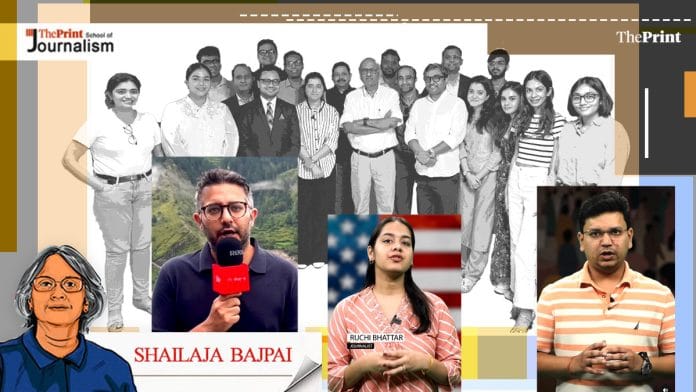Udit Hinduja. Udit Bubna. Ruchi Bhattar. From Mumbai, Delhi, and Kolkata. The first is from an edtech and microfinance background, the second worked for one of the Big Four global accounting firms, the third has just completed her law degree.
They’re as different as any three human beings can be, but they share one defining quality and one common ambition: a steely determination to be journalists.
That determination and ambition brought them to ThePrint, through ThePrint School of Journalism (TPSJ). The three are now full-time reporters here.
“I never thought I would be in ThePrint,” said Udit Bubna. Not only is he in ThePrint, he’s reporting on the key sectors of commerce, corporate India, and governance. And how: last Saturday, he had not one, not two, but three articles on ThePrint’s home page — on Bharat Taxi’s upcoming test drive, homegrown consulting firms, and India’s financial inclusion gap.
Ruchi Bhattar, confident and composed at the age of 23, is a fledgling legal eagle on ThePrint’s law reporting team.
“I feel I have fulfilled what I started out to achieve,” she said. “I am really passionate about reporting and about helping the public understand the law. Journalism, working with ThePrint, has shown me the lengths to which I can impact people’s lives.”
Udit Hinduja, from the first batch of TPSJ, was determined to be a journalist. After he received an internship opportunity at ThePrint, he converted it into a full-time role, working with different editors and writing articles on a wide range of topics, from the economy to Delhi’s AQI effect on newborn babies. The latter was “a game-changer” said Hinduja. It convinced him he wanted to join the Ground Reports team. Since then, he has shown flair and versatility in tackling very different stories.
Also Read: ThePrint is widening its lens. New shows on AI, economy, bureaucracy—and fresh newsletters
Making and mentoring journalists
ThePrint School of Journalism was launched in May 2024 to promote good journalism skills and to discover raw talent. ThePrint is constantly on the lookout for fresh talent so what better way to find it than in your own school?
That bet has paid off: Udit Hinduja, Udit Bubna, and Ruchi Bhattar are examples of how TPSJ has given people without any academic degree in journalism or communication an opportunity to become journalists.
They are not the only ones. All TPSJ interns work on stories and videos that are published on ThePrint’s website. Several of them have been prolific, and all of them enjoy being in the newsroom.
Of course, they need guidance. And they receive it from senior editors such as Rama Lakshmi (Editor, Opinion and Ground Reports), Nisheeth Upadhyay (Editor, Operations), and Janki Dave (News Editor), as well as senior journalists Moushumi Das Gupta and Manasi Phadke. Amrtansh Arora (Senior Assistant Editor) is the go-to person who mentors them on a day-to-day, week-to-week basis.
Courtroom to newsroom
Ruchi Bhattar was completing her law degree at the University of Calcutta when she applied to TPSJ.
“I am a first-generation lawyer in my family, and a first-generation journalist,” she revealed. “I wanted to be a lawyer and a full-time writer.”
She has chosen the latter for now. She joined TPSJ’s second batch in October 2024, saying she needed to “polish” her writing skills and acquire what she called “journalistic flair.” “Above all, I want to simplify the law for the average reader,” she said.
During her internship, she was mentored by ThePrint’s Legal Editor, Bhadra Sinha, who immediately saw a spark in her.
“She is diligent, disciplined, a learner who wants to learn more,” said Sinha. “She’s a very good researcher, she knows the law — and most importantly, understands what to tell the reader and just how much the reader needs to know (about a judgment).”

Bhattar has been prolific since she joined ThePrint as a trainee journalist in July 2025. She writes regularly on judgments and upcoming cases, and has begun visiting the courts in the past few months.
“It used to be intimidating, but now I like going there and networking,” she said.
Her reports this month include how the Supreme Court arrived at the green cracker ruling, the Delhi High Court’s landmark judgment on the Rights of Persons with Disabilities Act, and on how Indian courts have redrawn boundaries over use of temple funds.
She’s also written analytical articles, just as she said she wanted to, including deep dives into paternity tests in rape cases and the importance of case diaries in police investigations.
Bhattar is constantly trying to refine her writing and sense of news. She’s also thinking about the next step in her career.
“I want to cover politics and law — and of course, gender is always my focus,” said Bhattar. That may explain her piece on NCRB data on dowry deaths.
Mid-career leaps of faith
When TPSJ was launched, we hadn’t anticipated that we would unearth a talent trove among mid-career professionals. You’d be surprised at how many applicants to TPSJ are in their 30s and 40s. All of them are serious about learning how journalism works, even if they don’t go on to become journalists.
Some do. Udit Hinduja left a career in start-ups, while Udit Bubna left KPMG, to give themselves a chance at journalism. Both are in their mid-thirties and have brought their work experience and maturity to their reporting — switching careers requires courage and grit.
Bubna, 35, an MBA from FORE School of Management in Delhi, joined TPSJ after 11 years at KPMG, where he worked on financial due diligence as well as research and strategy. Even while he worked there, he’d been pondering a question: “I asked myself, ‘Do I want to continue doing it?’”
When he saw the advertisement for TPSJ, he decided to take a sabbatical and join the course. Like Bhattar, he’s a Batch 2 alumnus.
Bubna was already a frequent contributor to ThePrint’s subscriber initiative, ‘Your Turn’, where he had eight published pieces.

“My journey just fell into place,” he said. “TPSJ was a crash course in journalism and a platform for sharing opinions, knowledge… and then came the internship.”
With his background at KPMG, he now covers the commerce and corporate ministries — a gap in ThePrint’s coverage.
His first two big assignments during his internship, under Moushumi Das Gupta, set the ball, or his new career, rolling. They were about the PM’s internship programme in private companies and the government’s flagging e-commerce network, ONDC.
“Fantastic!” is how he described working on both. Both reports required diligence, data analysis, and initiative in finding people to speak to.
“These were complex stories, not your run-of-the-mill news reports — and he tackled both during the first few weeks of his internship,” recalled Das Gupta. “It’s not easy, but he did it on his own: finding numbers, convincing bureaucrats to speak to him, understanding the key issues involved… He is mature and has perspective.”
When I talk to Bubna, I am surprised at how easily and quickly he has slipped into thinking and speaking like any other journalist.
“You get a chance to meet all sorts of people, build connections, acquire knowledge, network — that excites me,” he said. “I am still learning how to be newsy, but I do come up with some ideas of my own.”
The Bharat Taxi story was his idea. He’s also been out of town on his first assignment, visiting schools in Vijayawada villages. He also wrote about mid-day meals while he was there.
“I was hesitant at first, but learnt how to talk to teachers and students… Look, I am still learning, but I have improved,” he added.
Straight into the deep end
Udit Hinduja, 34, could never have imagined that his first field assignment for ThePrint as a trainee journalist would be to cover one of the saddest events of 2025: the stampede at the ghats in Prayagraj during the Kumbh Mela.
But so it was. He spoke to people searching for their missing loved ones two days after the incident, as well as to survivors who recounted the horror and chaos. In another article, he wrote about the new safety measures put in place.
“I think it’s the best way to start out, to be thrown into the deep end for breaking news,” said Hinduja.

Since January 2025, Hinduja has been on the move, travelling frequently on difficult assignments for ThePrint. He went to Jaipur to cover Pahalgam victim Neeraj Udhwani’s funeral and to Uttarkashi to report on the landslides and floods — an assignment that saw him chosen as Journalist of the Month. He was also the first of several ThePrint reporters to reach Kathmandu during the student uprising and overthrow of the KP Sharma Oli government.
The adrenaline pumped fast as he stood amid the student protesters.
“All of these assignments were eye-opening experiences. Informative but also tough in terms of travel, skipping meals,” he said. “And they cause a lot more anxiety. There’s no time, no time to think — you just have to file as quickly as possible.”
Hinduja joined TPSJ’s first batch after the edtech start-up he had co-founded with a friend, and worked on for seven years, was sold. A graduate of New York University, he’d also worked in microfinance.
“I have always been very curious and have many interests. I wanted to satiate my curiosity, meet people, and explore different areas,” he said.
Well, he has explored a great deal. He has done on-the-spot news stories and written in-depth features on Andaman crocodiles, a women’s football league, Delhi’s Mahjong elites, Air India, and India’s Libertarian Party. Business and tech are in his wheelhouse too — from how Bengaluru’s billionaires are changing CSR to the red-tape stranglehold on Indian startups.
From the beginning, he was determined to be noticed, to impress the editors.
“I needed to get a job, I really wanted it,” he said. TPSJ and the internship only reinforced that.
Rama Lakshmi, who is in charge of the Ground Reports team, said: “He is enthusiastic, eager to learn, and hungry for new opportunities. That is always a delight to work with. He brings a fresh perspective to news, and his experience in business and the tech sector helps him to report on them and fill a gap at ThePrint.”
Also Read: ThePrint at 8. Readers are evangelists, critics, and asserting their ‘right’
Risks and rewards
Learn to be newsy; improve your writing and storytelling. This is the advice all three receive from their editorial mentors. They are taking it seriously.
“It’s my priority,” said Hinduja.
“My writing has improved, but I’m still learning,” said Bubna.
They also agree that their families worry about the path they’ve chosen and the journey ahead.
“Definitely my parents worry. They think law and journalism are risky fields,” said Ruchi.
Still, they’re determined to continue. “Each day at a time,” said Bubna.
They’ve grown with the experience and changed.
“You always need to be agile and adapt to the situation as and when it arises. Also, you learn to be a quick thinker and it brings out a creative side which you thought you never had,” added Bubna.
Hinduja has discovered facets of himself he wasn’t aware of.
“I can be quite resilient, adaptable. I’ve learnt there’s no black and white, only many shades of grey. You learn to give people more leeway,” he said.
And what about Ruchi Bhattar? “There’s been a crazy amount of growth for me.”
Shailaja Bajpai is ThePrint’s Readers’ Editor. Please write in with your views and complaints to readers.editor@theprint.in
(Edited by Asavari Singh)






